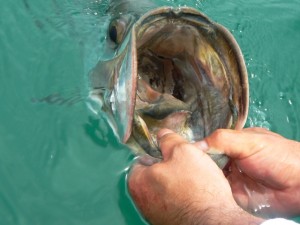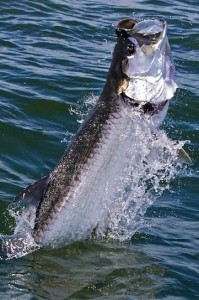TARPON: The Silver King!
 Tarpon are also known as The Silver King and for good reason! Tarpon are large, hard fighting fish and are judged by many to be the world’s most exciting game fish on both fly and spinning reel. Once a tarpon is hooked, it begins a spectacular display of leaping and twisting acrobatic displays into the air. Tips for Tarpon are generally between 25 to 80 pounds on average but can range from a few inches in length to almost 300 pounds. The world all tackle record is 283 pounds 4ounces, a truly mighty fish! Tarpon eat crabs, shrimp, pinfish and mullet.
Tarpon are also known as The Silver King and for good reason! Tarpon are large, hard fighting fish and are judged by many to be the world’s most exciting game fish on both fly and spinning reel. Once a tarpon is hooked, it begins a spectacular display of leaping and twisting acrobatic displays into the air. Tips for Tarpon are generally between 25 to 80 pounds on average but can range from a few inches in length to almost 300 pounds. The world all tackle record is 283 pounds 4ounces, a truly mighty fish! Tarpon eat crabs, shrimp, pinfish and mullet.
Fishing Technique.
You really need a game plan if you are going to be a successful light tackle tarpon master. Tarpon are powerful and have hard rough mouths, sharp gill plates and abrasive scales. They have extremely tough mouths that are hard and boney and it takes special skill to successfully stick the big ones and get a good hook set. Rule number one – use a sturdy sharp hook and re-sharpen it often! Because of their sharp gill plates and equally sharp tough scales leaders and leader materials are very important I suggest tarpon fishing leaders should be about 6 to 12 feet in length and of heavy monofilament or fluorocarbon line from 60 to 125 LB test. A 6/0 live bait hook to an 11/0 circle hook is a good place to start when selecting a hook. Your choice of rod and reel is less important – spend your time on a variety of fresh live bait and on your terminal tackle and on getting it right.
Baits
 Tarpon are difficult fish to catch. One day they will like small pinfish and another day crabs and on another day something else entirely different, so having a good variety of bait to offer when you go out is important and will increase your chance of a hook up. Tarpon are successfully caught on artificial lures and fly rods and is really considered the top of the sport. From old stand bys like the topwater Zara Spook to sophisticated handcrafted fly’s- the choices for artificial baits are endless. In my opinion fly fishing tips for Tarpon is at the very pinnacle of the game and my all-time preferred method of hunting and catching these fantastic game fish. On light tackle or fly, a large tarpon can take you on an hour-long adventure that will cover most of the available landscape as you chase him and he pulls you around. Your skill as an angler and the quality of your gear and terminal tackle are tested to the extreme. Knots! Knots, knots, and more knots!! All fishing depends on good knot tying- if you don’t have a good understanding of knots then start learning how to tie them now- there is nothing more important to any angler and especially so in big tough game fish like tarpon fishing. At a bare minimum know these knots and how to constantly and successfully tie them under a variety of conditions and with a variety of line sizes and types of line materials- the loop knot, the clinch knot or uni-knot, the surgeons’ knot and the blood knot. Always be sure you pull your knots uptight!
Tarpon are difficult fish to catch. One day they will like small pinfish and another day crabs and on another day something else entirely different, so having a good variety of bait to offer when you go out is important and will increase your chance of a hook up. Tarpon are successfully caught on artificial lures and fly rods and is really considered the top of the sport. From old stand bys like the topwater Zara Spook to sophisticated handcrafted fly’s- the choices for artificial baits are endless. In my opinion fly fishing tips for Tarpon is at the very pinnacle of the game and my all-time preferred method of hunting and catching these fantastic game fish. On light tackle or fly, a large tarpon can take you on an hour-long adventure that will cover most of the available landscape as you chase him and he pulls you around. Your skill as an angler and the quality of your gear and terminal tackle are tested to the extreme. Knots! Knots, knots, and more knots!! All fishing depends on good knot tying- if you don’t have a good understanding of knots then start learning how to tie them now- there is nothing more important to any angler and especially so in big tough game fish like tarpon fishing. At a bare minimum know these knots and how to constantly and successfully tie them under a variety of conditions and with a variety of line sizes and types of line materials- the loop knot, the clinch knot or uni-knot, the surgeons’ knot and the blood knot. Always be sure you pull your knots uptight!
Catch and Release!
We don’t eat Tarpon– they are strictly a catch and release game fish. Always take the greatest care with these beautiful prehistoric sea creatures. These incredible fish were made for angling and you should do everything possible to preserve our tarpon fishery for the generations to come. When using live bait tarpon fishing with circle hooks are the best for releasing the fish unharmed. Try not to fight a tarpon so long that it becomes completely exhausted- their perfect shark food in this state. Releasing tarpon at the side of the boat without lifting the fish out of the water produces the best results for the health of the tarpon. Lifting a tarpon out of the water or dragging a tarpon over the side of a boat for a photograph will potentially kill or damage the fish. Wear gloves to the leader and handle a tarpon so you can leave the tarpon in the water and grab the lower jaw you’re your gloved hand to remove a hook. If you can’t remove the hook don’t panic- just cut the leader as short as possible- the saltwater will dissolve the hook and the fish will recover fine.







